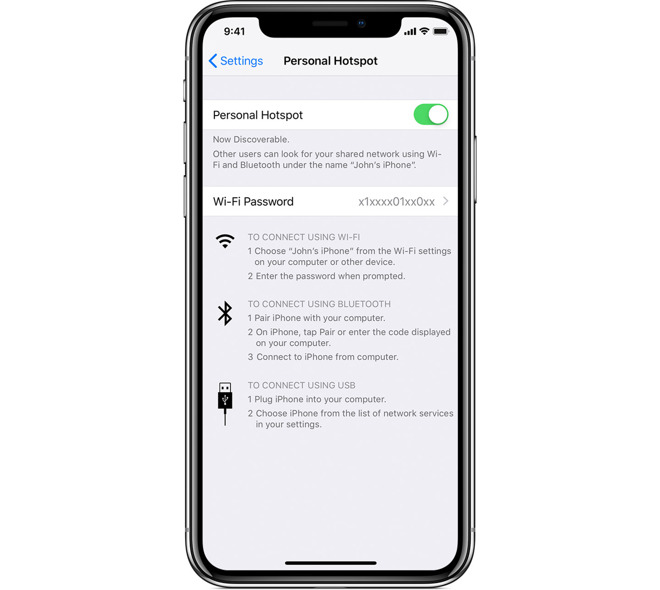iPhone 'Personal Hotspot' tech violates networking patent, lawsuit claims
A Wyoming firm, WiNet Labs, is suing Apple for allegedly infringing on a networking patent with its "Personal Hotspot" feature found in iPhone and iPad.

The U.S. patent in question is No. 7,593,374, "Multi-to-multi point ad-hoc wireless data transfer protocol," according to a complaint submitted with the U.S. District Court for the Northern District of California on Thursday.
The IP details a method of setting up and managing an ad-hoc network between multiple devices. Importantly, the patent incorporates steps for organizing multiple nodes within said network, including a controlling, or coordinating, node that WiNet claims is akin to a Wi-Fi-serving hotspot device.
WiNet says that its predecessor offered to sell the patent to Apple through an agent in 2014 but was ignored.
WiNet is seeking a jury trial, with the ultimate goal of "a fair and reasonable royalty," "treble damages," and pre- and post-judgment interest "at the maximum rate allowed by law."
The '374 patent dates back to May 2005, and was eventually granted to a Chinese company called M-LABS, Ltd. in August 2005. That firm is now listed as a shared assignee.
The patent became available for license or sale in December 2009. WiLab and/or M-LABS were repeatedly late with maintenance fees however, to the point that the patent lapsed toward the end of 2017. Sometime after it appears to have been revived.
Neither WiNet nor M-LABS have much if any presence online, suggesting they could be patent "trolls" with no commercial products. Given its track record, Apple will likely try to have the case dismissed or the patent ruled invalid.

The U.S. patent in question is No. 7,593,374, "Multi-to-multi point ad-hoc wireless data transfer protocol," according to a complaint submitted with the U.S. District Court for the Northern District of California on Thursday.
The IP details a method of setting up and managing an ad-hoc network between multiple devices. Importantly, the patent incorporates steps for organizing multiple nodes within said network, including a controlling, or coordinating, node that WiNet claims is akin to a Wi-Fi-serving hotspot device.
WiNet says that its predecessor offered to sell the patent to Apple through an agent in 2014 but was ignored.
WiNet is seeking a jury trial, with the ultimate goal of "a fair and reasonable royalty," "treble damages," and pre- and post-judgment interest "at the maximum rate allowed by law."
The '374 patent dates back to May 2005, and was eventually granted to a Chinese company called M-LABS, Ltd. in August 2005. That firm is now listed as a shared assignee.
The patent became available for license or sale in December 2009. WiLab and/or M-LABS were repeatedly late with maintenance fees however, to the point that the patent lapsed toward the end of 2017. Sometime after it appears to have been revived.
Neither WiNet nor M-LABS have much if any presence online, suggesting they could be patent "trolls" with no commercial products. Given its track record, Apple will likely try to have the case dismissed or the patent ruled invalid.
WiNet Patent Suit by on Scribd

Comments
[crickets]
Huh. Funny how ONLY Apple gets sued over an industry-wide standard (that Apple didn't even implement -- carriers did -- Apple just allowed for hooks to their technology in iOS).
Our system is whack.
Sometimes a "patent troll" goes after only small fry, and sometimes they go after a different big fish first as recently happened when Google was sued before eventually settling which encouraged the patent owner to move on to Apple next. Different companies get targeted first for various reasons.
It seems obvious that a company shouldn't be able to hold a patent then file suit for countless backdated damages. This means the other companies were unwittingly commercialising/innovating their basic technology. Rather they should have to prove why they were not able to file earlier and have their potential damages limited accordingly.
I get why we went down a “jury” based system, but I’m not a fan in general. It’s an extremely expensive and inefficient system, where misjustice is frequent. It doesn’t work for this century...
I favor a panel... but a “specialist jury” would be interesting for patents.
Judge alone or panel of judges
Judges would, as usual, use their expertise and knowledge of the law to decide on the evidence and reach a verdict. This could remedy one potential weakness of juries, being that jury members often do not have a good knowledge of the law. Yet, if this were the case, there would be no trial by one’s peers, and the community would be out of touch with their legal system.
Specialist jury
Juries would be tailored to each individual case. For instance, in a medical malpractice case, a jury could be made up of doctors. The jury would, therefore, have expertise on the evidence and facts at hand. Despite this clear disadvantage, the general community would again be distanced from the legal process.
Professional jury
Juries could be comprised of people who are employed as professional jurors. Because their job would be permanent, these jurors would understand their role, as well as rules of evidence and procedure. Yet, this would distance community members from the legal process.